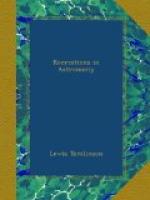[Page 15] ii.
Creative progress.
“And God said, Let there be light,
and there was light.”—Genesis
i., 3.
“God is light.”—1 John, i. 5.
[Page 16]
“Hail! holy light, offspring of
Heaven first born,
Or of the eternal, co-eternal beam,
May I express thee unblamed? since God
is light,
And never but in unapproached light
Dwelt from eternity, dwelt then in thee,
Bright effluence of bright essence increate.”
Milton.
“A million torches lighted by Thy
hand
Wander unwearied through the blue abyss:
They own Thy power, accomplish Thy command,
All gay with life, all eloquent with bliss.
What shall we call them? Piles of
crystal light—
A glorious company of golden streams—
Lamps of celestial ether burning bright—
Suns lighting systems with their joyous
beams?
But ’Thou to these art as the noon
to night.”
DERZHAVIN, trans. by Bowring.
[Page 17] ii.
CREATIVE PROGRESS.
Worlds would be very imperfect and useless when simply endowed with attraction and inertia, if no time were allowed for these forces to work out their legitimate results. We want something more than swirling seas of attracted gases, something more than compacted rocks. We look for soil, verdure, a paradise of beauty, animal life, and immortal minds. Let us go on with the process.
Light is the child of force, and the child, like its father, is full of power. We dowered our created world with but a single quality—a force of attraction. It not only had attraction for its own material substance, but sent out an all-pervasive attraction into space. By the force of condensation it flamed like a sun, and not only lighted its own substance, but it filled all space with the luminous outgoings of its power. A world may be limited, but its influence cannot; its body may have bounds, but its soul is infinite. Everywhere is its manifestation as real, power as effective, presence as actual, as at the central point. He that studies ponderable bodies alone is not studying the universe, only its skeleton. Skeletons are somewhat interesting in themselves, but far more so when covered with flesh, flushed with beauty, and inspired with soul. The universe [Page 18] has bones, flesh, beauty, soul, and all is one. It can be understood only by a study of all its parts, and by tracing effect to cause.
But how can condensation cause light? Power cannot be quiet. The mighty locomotive trembles with its own energy. A smitten piece of iron has all its infinitesimal atoms set in vehement commotion; they surge back and forth among themselves, like the waves of a storm-blown lake. Heat is a mode of motion. A heated body commences a vigorous vibration among its particles, and communicates these vibrations to the surrounding air and ether. When these vibrations




